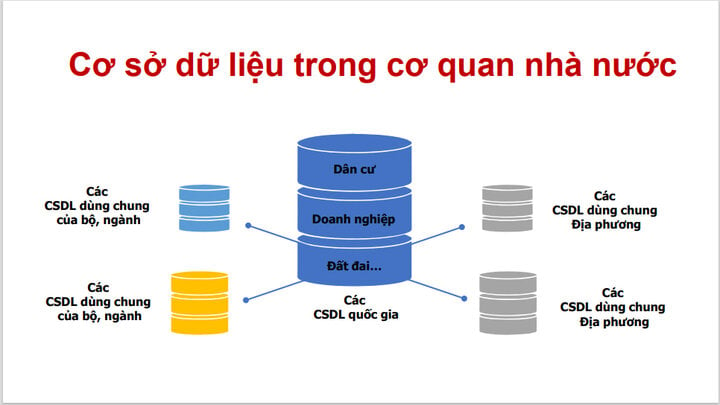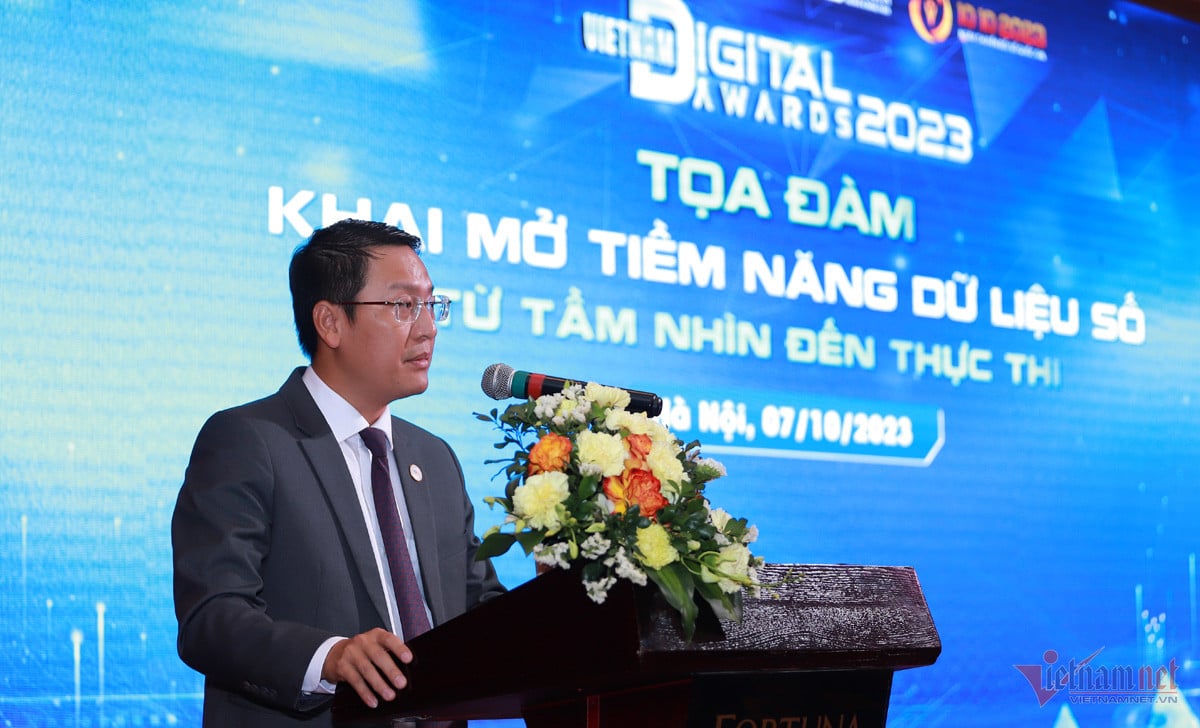The special role of data
According to Mr. Nguyen Phu Tien, Deputy Director in charge of the National Digital Transformation Agency, data is a new resource in the digital space. State agencies are actively building and opening this resource to develop digital government, digital economy, and digital society.

Databases are being actively built and operated to promote the national digital transformation process.
The National Digital Transformation Program to 2025, with a vision to 2030, clearly states the goal: By 2025, 100% of national databases creating a foundation for e-Government development, including national databases on population, land, business registration, finance, and insurance, will be completed, connected, and shared nationwide.
Step by step open data of state agencies to provide timely public services, one-time declaration, full life cycle serving people and socio-economic development.
By 2030, form a data platform for key economic sectors based on data from state agencies and Internet of Things (IoT) infrastructure, widely connect and share among state agencies, reduce 30% of administrative procedures; open data to organizations and businesses, increase 30% of innovative data-based services serving people and businesses.
Mr. Tien said that in order to exploit and promote the effectiveness of data in digital transformation, in the coming time, a number of important tasks will be implemented, including: managing and administering digital data and databases; developing national databases; ensuring the ability to connect and share data; deploying digital platforms to collect and manage data; promoting and exploiting the potential of big data, creating momentum for socio-economic development.
Sharing the view that data is a new unlimited resource, the more it is exploited and used, the more data it expands and the more value it adds, Mr. Nguyen Duc Kien, Deputy General Director, VNPT Information Technology Company further analyzed: " Digital transformation is a process of overall and comprehensive change of individuals and organizations in the way of life, working and production methods based on digital technology and digital data.
Data is the “heart” of digital transformation. Data infrastructure is the key factor for digital transformation. Exploiting and connecting the life data of the national digital platform contributes to improving the efficiency of government operations, is a tool to measure and monitor the implementation of digital transformation to create new opportunities to reshape competitive advantages, promote socio-economic development .
Mr. Duong Cong Duc, Director of Smart City Center, Viettel Enterprise Solutions Corporation also said that digital transformation is essentially the process of building, creating, and exploiting digital data, ensuring that the data is "correct - sufficient - clean - alive", providing information, supporting decision making, applying it to the process of living, production, business, and management to create many new values.
“ In the UK, it took an employee just 15 minutes to help the Government save millions of pounds by detecting duplicate expenditures in the government's public spending data ,” Mr. Duc cited an illustrative example.
What to do to promote the role of data in digital transformation
Identifying data as the “key” to promoting digital transformation, in Lao Cai province, the Provincial Data Strategy was completed.
Mr. Vu Hung Dung, Director of the Department of Information and Communications of Lao Cai province, said that the provincial data strategy brings many values to the locality such as: helping agencies in the province recognize the effectiveness of using specialized data, shared data and open data in developing digital government and smart cities, digital economy and digital society.
Contribute to increasing the productivity and service quality of agencies with people and businesses; limit overlapping investment in systems/software; minimize data fragmentation.
In particular, the provincial data strategy helps Lao Cai identify a new approach in planning digital transformation, the province's information technology development plan must be based on the needs of data management, use and exploitation. From there, it is determined which systems/software need to be invested in.
However, Director Vu Hung Dung also frankly mentioned some difficulties and challenges when building Lao Cai province's data strategy in recent times.
Accordingly, the Central Government has not yet issued a national data strategy, ministries and branches have not yet fully issued their sectoral data strategies, have not fully issued a list of shared databases and open data; have not fully issued a list of specialized systems/software that local levels need to implement, causing difficulties in clearly identifying the basis for implementation.
Along with that, most state agencies in the province do not grasp the overall data picture of their sector, affecting the work of collecting and surveying data. Many agencies are still confused in determining the problems of the unit that can be effectively solved by data analysis and forecasting.
“ This is a new job, no province/city in the country has done it. Therefore, we mainly refer to documents and build based on the perspective of solving the problems that we see.
We have reviewed all documents and directions of the Government and ministries and branches related to data development to ensure that the Data Strategy complies with the national and ministerial directions, "said the Director of the Department of Information and Communications of Lao Cai province, sharing the implementation experience in the locality.

Data is only valuable when it is exploited and used in life.
From the perspective of a business that has supported many localities in exploiting and promoting the role of data in digital transformation, Mr. Duong Cong Duc noted a number of challenges with data building and exploitation issues such as: limited data sharing activities due to lack of regulations; lack of cooperation mechanisms; lack of trust; unassured data quality; lack of interaction.
Recommending mechanisms and policies for data exploitation to accelerate the National Digital Transformation Strategy, Mr. Duc said that it is necessary to review and perfect laws and policies related to digital data to protect personal data and ensure data use.
At the same time, ensure telecommunications infrastructure, cloud (cloud computing), IoT (Internet of Things) and AI (artificial intelligence), popularize mobile and Internet so that people can widely access digital data; build a close cooperation environment between the government and businesses, encourage businesses to participate in data sharing; train human resources with knowledge and skills related to digital data.
With the view that connecting and interoperating data is the responsibility of both the government and businesses, Mr. Le Hong Quang, Permanent Deputy General Director of MISA Joint Stock Company analyzed: " If businesses cannot connect and exploit databases, they cannot have good products, cannot optimize operations, causing waste to society.
To facilitate data exploitation for businesses, the government needs to clearly define what kind of businesses can connect and exploit.
The General Department of Taxation, Social Insurance, Ministry of Education and Training... build a national database that allows many businesses and individuals to proactively connect, contribute, and exploit, helping the database become more complete, businesses provide better services, and people become more convenient.
However, at present, there are many connection needs of businesses that are not being addressed, or some databases are being monopolized, directly affecting the interests of businesses and people .
“ The construction of a national database must be considered a shared responsibility of the government, intermediary connecting units, and organizations and individuals contributing data.
It is necessary to allow technology businesses to connect as long as they meet certain standards set by the government, not monopolize the connection to diversify data; allow businesses and people to exploit when they satisfy the conditions because data only has value when exploited ," Mr. Quang recommended.
Hien Minh
Source










































Comment (0)